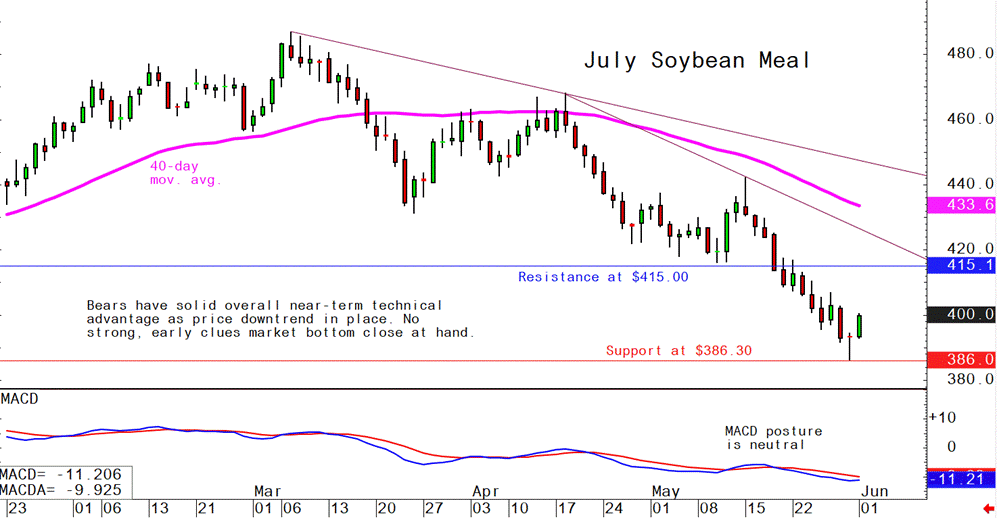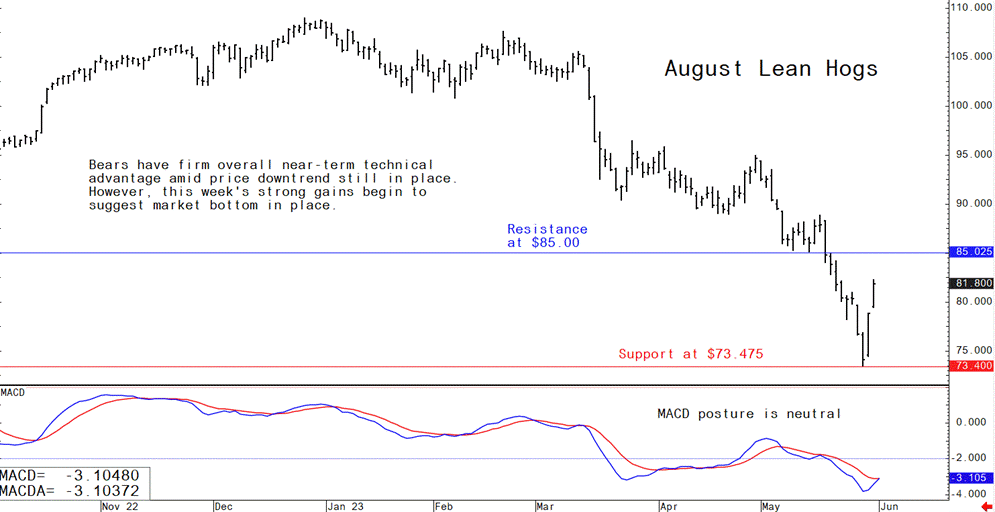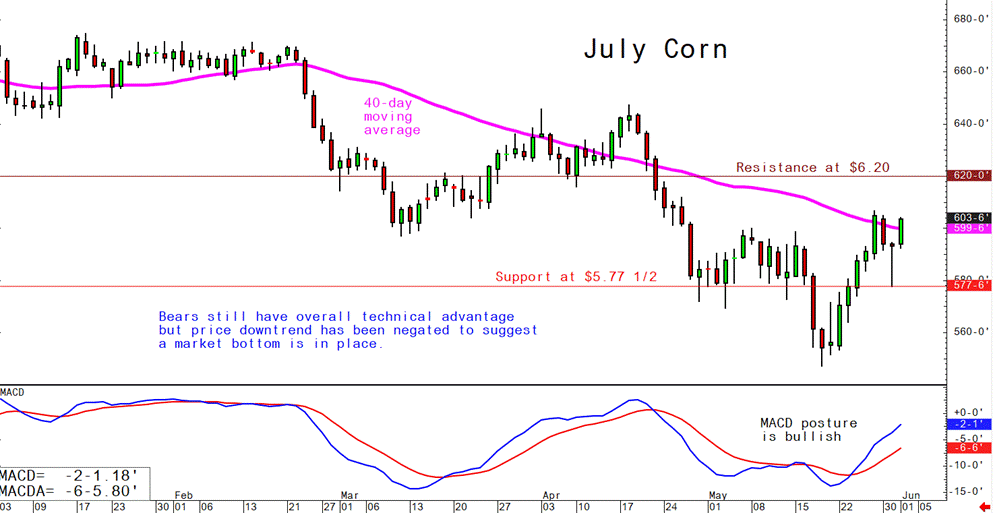



Pig outlook: Early signs of lean hog futures market bottom, US & Canada swine industries experiencing losses
Analyst Jim Wyckoff shares update on global swine industryLean hog futures price action this week may be forming a potential “V” bottom reversal on the daily price chart. Still, with summer-month contracts back at premiums to the cash index the cash market must strengthen to build sustained buyer interest in futures. The latest official quote for the CME lean hog index is $80.08. Recent wholesale pork price strength is encouraging the bulls amid a likely increase in US consumer demand for pork during the grilling season. The seasonal wholesale pork price strength has historically persisted into mid-July. It’s probable that the cash hog and futures markets have put in seasonal price bottoms and that prices will work sideways to higher in the coming weeks.
$54 billion US pork industry is being whipsawed by supply and demand forces
Years of rapid expansion have left the sector oversupplied as demand is waning, costs are rising and new regulations are looming. The Wall Street Journal reports hog farmers are being squeezed and some are even being driven out of business as they lose money at the worst rate in decades. The impact is cascading through supply chains, as businesses from hog farms to processing plants scale back operations and meatpacking companies including Smithfield Foods, Tyson Foods and JBS wrestle with shrinking profits. The turbulence is the result of rapid changes in markets. Booming overseas demand led many producers to expand operations, particularly after hog herds in China were devastated by African swine fever. Trade wars cut into that business, and more recently the strong U.S. dollar has made U.S. pork more expensive abroad.
China’s sow herd declines in April but bigger than year-ago
China’s sow herd declined 0.5% in April to 42.8 million head, according to the country’s ag ministry. However, it was still 2.6% larger than last year.
Follow-up on California’s Prop 12 and pork
Following a recent Supreme Court ruling on California’s Prop 12 and pork, Massachusetts' local meat industry is concerned about a potentially significant increase in pork prices due to the possible enactment of a 2016 animal welfare law. This law could take effect as soon as mid-July and would mandate that all "whole pork" items sold in the state must comply with certain animal welfare standards.
Supreme Court Ruling: The Supreme Court upheld a Californian law requiring pork products sold in the state to meet certain guidelines concerning pig pen size. A similar law was approved in Massachusetts seven years ago, and it is now slated to come into effect.
Impact on Pork Products: The Massachusetts law covers all uncooked "whole pork" items like bacon, ham, chops, ribs, roasts, or cutlets made entirely of pork meat. However, combined pork products like hot dogs are not included. Local pork sellers anticipate a significant increase in pork prices as a result.
Roots of the Law: The Act to Prevent Cruelty to Farm Animals was overwhelmingly approved by Massachusetts voters in 2016. It set certain animal welfare standards for eggs, veal, and pork sold in the state. However, the pork regulations were delayed due to legal challenges to a similar law in California.
Challenge from the Pork Industry: Industry groups argue that meeting the new standards will increase the cost of production and hence the price of pork. Only 4% of U.S. pork currently meets the new Massachusetts and California standards, according to some estimates.
Jim Monroe, a spokesperson for Smithfield Foods, which slaughters 30 million hogs a year and is the country’s largest pork producer, said the company spent $360 million to convert its 400 corporate-owned farms to a so-called group-housing system that provides sows with more room, which debuted in 2017. While some animal rights groups hailed the Smithfield system as more humane, others contend gestational crates remain a significant part of Smithfield’s operations.
Massachusetts timeline: Local pork-sellers are waiting for guidance on how to proceed. The attorney general’s office said any petition for a rehearing on the California law would need to be filed by June 5, and if none is made, the high court will issue its final judgment the week of June 12. That would then trigger a 30-day deadline of July 12 for the pork regulations to go into effect.
A spokesman for Attorney General Andrea Campbell said her office is “reviewing the decision and will provide updates when we have more to say about next steps.” Lawmakers so far have been mum about any legislative fixes.
State Senator Jason Lewis, who sponsored the Massachusetts bill, said in a statement that he “is pushing hard for this law to go into effect and start being enforced as soon as possible.” But even as they await guidance, restaurants, grocery stores, and food banks are bracing for the impact.
Impact on Low-Income Households: The implementation of the law might result in a near doubling of pork prices, which could disproportionately affect people near or below the poverty line. Many immigrant populations and food banks rely heavily on pork, raising concerns about accessibility and affordability.
Response from Supporters: Supporters of the law argue that it reflects public sentiment against the inhumane treatment of farm animals. They acknowledge that there might be some price implications, but they believe that the voters were aware of this when they approved the measure.
Preparation for law implementation: Restaurants and food service industries in Massachusetts are preparing for the potential effects of the law, with some considering price hikes and changes to their menus. However, proponents believe that pork producers will need to adapt to these changes, as consumers increasingly demand ethically raised food.
Pork sector, especially in Canada, facing a challenging road to profitability
This is due to several adverse conditions that include declining domestic demand, reduced export opportunities, and potential U.S. animal welfare regulations that could lead to lower prices. In an interview with RealAg Radio host Shaun Haney, Christine McCracken, Rabobank's senior analyst for animal protein, says pork producers are currently incurring losses of $40 to $50 per head. Although there has been a slight improvement in feed costs, the high cost of production and price pressure could necessitate moves to reduce production.
The industry, after experiencing high demand during the Covid-19 pandemic, is now dealing with decreased consumption and oversupply in a post-pandemic environment. McCracken states that supply is currently outpacing demand and this imbalance will take time to correct.
Export markets do not seem to offer significant relief for the oversupply of pork, with McCracken doubting that consumers will switch their protein preferences significantly. Despite strong exports driven by reduced pork production in regions like China and Europe, global economic issues, such as inflation and economic slowdown, could reduce the demand for pork.
In addition, the recently upheld California's Prop 12 animal welfare initiative could disrupt domestic markets. The law, which sets space requirements for livestock in production systems, stipulates that all pork sold in California must be produced in compliance with its regulations. Given that a significant amount of current pork production is not compliant with these new rules, the industry could be flooded with excess pork that isn't eligible for export or for shipment into California. This could lead to additional challenges for producers.
The next week’s likely high-low price trading ranges:
August lean hog futures--$75.00 to $85.00 and with a sideways-higher bias
July soybean meal futures--$386.30 to $415.00, and with a sideways bias
July corn futures--$5.85 to $6.15 and a sideways-higher bias
Latest analytical daily charts lean hog, soybean meal and corn futures










